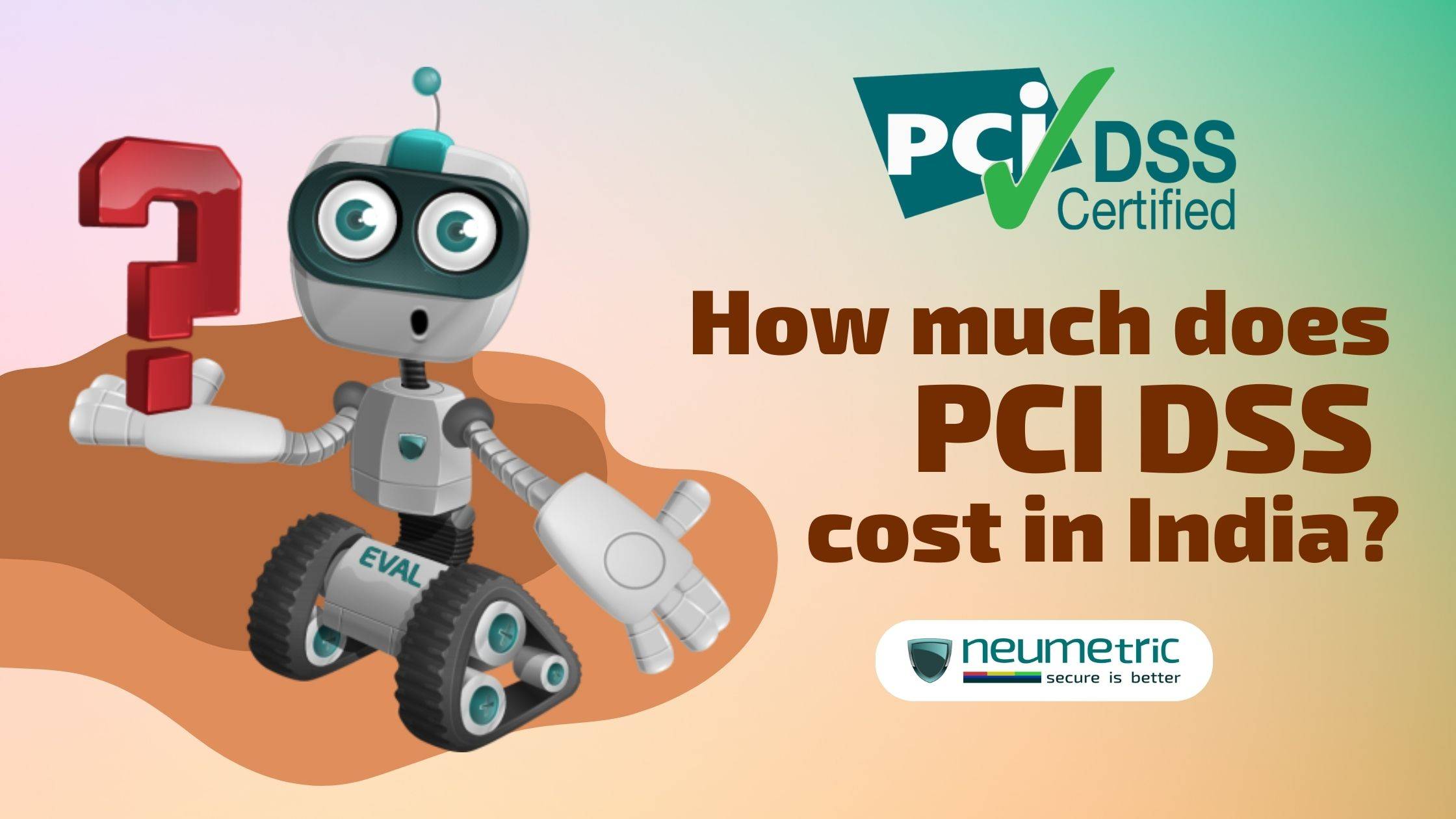Table of Contents
ToggleHow much does PCI DSS Compliance Cost for an Organisation in India?
Introduction
The Payment Card Industry Data Security Standard [PCI DSS] is a set of Security Standards designed to protect sensitive information related to Credit & Debit Card transactions. The Standard applies to any Organisation that accepts, processes, stores, or transmits Cardholder Data. The Compliance process involves implementing security controls & practices to ensure the confidentiality, integrity & availability of Cardholder Data.
PCI DSS Compliance is critical for Organisations that handle Cardholder Data. Non-compliance can result in severe consequences, such as data breaches, financial penalties, legal action & damage to reputation. Therefore, it is crucial for Organisations to take the necessary steps to ensure Compliance.
The purpose of this Journal is to provide insight into the cost of PCI DSS Compliance for Organisations in India. We will look at the various factors that influence the cost of Compliance, including the Organisation’s size, level of Compliance & Scope of the Assessment. Additionally, we will explore the benefits of PCI DSS Compliance, including enhanced security, improved customer trust & reduced risk of financial losses. By the end of this Journal, you will have a better understanding of what it takes to achieve PCI DSS Compliance & the associated costs for your Organisation.
Understanding PCI DSS Compliance Cost
When it comes to PCI DSS Compliance, there are several factors that can impact the cost for an Organisation. Let’s take a closer look at some of the key factors that affect the cost of Compliance.
- Size of the Organisation: The size of the Organisation is a crucial factor that affects the cost of PCI DSS Compliance. Larger Organisations with more Cardholder Data will have a more complex Environment that requires additional security measures, resulting in higher Compliance costs.
- Level of Compliance: The level of Compliance required by an Organisation is another significant factor in determining the cost of Compliance. There are four levels of Compliance & the higher the level, the more stringent the requirements & the higher the cost.
- Scope of the Assessment: The Scope of the Assessment is another factor that impacts the cost of Compliance. Organisations can choose to assess their entire Environment or only specific systems or processes. The broader the Scope, the higher the cost of Compliance.
Now that we’ve covered the factors that impact the cost of Compliance, let’s take a look at the specific costs associated with achieving & maintaining PCI DSS Compliance.
- Cost of Hiring a Qualified Security Assessor [QSA]: One of the most significant costs associated with PCI DSS Compliance is hiring a Qualified Security Assessor [QSA]. A QSA is an Independent Security Expert who assesses an Organisation’s Compliance with the PCI DSS Standards. The cost of hiring a QSA can range from a few thousands of dollars to tens of thousands of dollars, depending on the size & complexity of the Organisation’s environment.
- Cost of Implementing Necessary Security Measures: Implementing necessary security measures is another significant cost associated with PCI DSS Compliance. Organisations may need to invest in additional hardware, software, or services to meet the requirements of the PCI DSS Standards. These costs can vary widely depending on the Organisation’s specific needs.
- Cost of Maintaining Compliance: Maintaining Compliance is an ongoing process & requires regular monitoring & maintenance. This includes activities such as regular security testing, system updates & Employee training. The cost of maintaining Compliance can vary depending on the size & complexity of the Organisation’s environment, but it is an ongoing expense that Organisations must budget for.
In conclusion, achieving & maintaining PCI DSS Compliance can be a costly endeavour for Organisations. However, the cost of non-compliance can be even higher in terms of financial losses, legal penalties & damage to reputation. By understanding the factors that impact the cost of Compliance & budgeting appropriately, Organisations can ensure they are adequately protected against the risks associated with Cardholder Data breaches.
The cost of PCI DSS Compliance for Indian Organisations
Let’s take a closer look at the cost of PCI DSS Compliance for Indian Organisations. India is a rapidly growing market & the adoption of electronic payments is increasing significantly. As more Organisations adopt electronic payments, the need for PCI DSS Compliance also increases. However, the cost of Compliance can be a significant challenge for Indian Organisations, particularly for Small & Medium-sized Businesses.
PCI DSS Compliance cost in India can vary depending on the size & complexity of the Organisation’s environment. Here is a breakdown of some of the significant costs associated with PCI DSS Compliance for Indian Organisations:
- Hiring a Qualified Security Assessor [QSA]: The cost of hiring a QSA in India can range from ₹3,00,000/- INR to ₹15,00,000/- INR depending on the level of Compliance required & the size & complexity of the Organisation’s environment.
- Implementing Necessary Security Measures: Implementing necessary security measures can range from ₹500,000/- INR to ₹5,000,000/- INR, depending on the Organisation’s specific needs.
- Maintaining Compliance: The cost of maintaining Compliance in India can range from ₹200,000/- INR to ₹10,00,000/- INR annually, depending on the size & complexity of the Organisation’s environment.
Now, let’s look at some case studies/examples of the cost of Compliance for Indian Organisations.
Case Study 1: A large Indian e-commerce company with over 1,000 employees & a significant online presence needed to achieve PCI DSS Compliance. The cost of Compliance for this Organisation was approximately ₹15,000,000/- INR, which included hiring a QSA, implementing necessary security measures & ongoing maintenance.
Case Study 2: A small Indian retailer with five stores & less than 50 employees needed to achieve PCI DSS Compliance. The cost of Compliance for this Organisation was approximately ₹500,000/- INR, which included hiring a QSA, implementing necessary security measures & ongoing maintenance.
As you can see, PCI DSS Compliance cost can vary significantly depending on the size & complexity of the Organisation’s environment. However, the cost of non-compliance can be even higher in terms of financial losses, legal penalties & damage to reputation. Therefore, it is critical for Indian Organisations to take the necessary steps to achieve & maintain PCI DSS Compliance to protect themselves & their customers against the risks associated with Cardholder Data breaches.
Benefits of PCI DSS Compliance
PCI DSS Compliance is not just an obligation but also an opportunity for Organisations to enhance their security posture & establish a strong foundation for protecting Cardholder Data. By achieving & maintaining PCI DSS Compliance, Organisations can enjoy several benefits, including:
- Reduced Risk of Data Breaches: PCI DSS Compliance provides a framework for Organisations to secure their Payment Card Data, reducing the risk of data breaches. Data breaches can result in significant financial losses, legal liabilities & reputational damage. By implementing PCI DSS Compliance measures, Organisations can reduce the likelihood of data breaches & minimise the impact if one occurs.
- Increased Trust with Customers & Business Partners: Customers & business partners are increasingly aware of the importance of data privacy & security. By achieving PCI DSS Compliance, Organisations can demonstrate their commitment to protecting customer Payment Card Data, which can increase trust & confidence in their brand.
- Improved Reputation & Brand Image: Data breaches can have a severe impact on an Organisation’s reputation & brand image. By implementing PCI DSS Compliance measures, Organisations can establish themselves as responsible custodians of customer Payment Card Data & improve their reputation & brand image.
- Competitive Advantage: Achieving & maintaining PCI DSS Compliance can also provide a competitive advantage for Organisations. Compliance can demonstrate to customers & business partners that an Organisation takes data privacy & security seriously & has established robust security measures to protect Payment Card Data.
Conclusion
In summary, PCI DSS Compliance is essential for Organisations that handle Payment Card Data. Compliance provides a framework for securing Payment Card Data, reducing the risk of data breaches & building trust with customers & business partners. However, achieving & maintaining PCI DSS Compliance can come at a significant cost to Organisations, particularly for Small & Medium-sized Businesses.
Factors that affect the cost of Compliance include hiring a Qualified Security Assessor, implementing necessary security measures & maintaining Compliance. In India, the cost of Compliance can range from hundreds of thousands to millions of rupees, depending on the size & complexity of the Organisation’s Environment.
Despite the cost, it is critical for Indian Organisations to prioritise PCI DSS Compliance to avoid costly data breaches, legal penalties & reputational damage. Compliance can also provide a competitive advantage for Organisations that demonstrate their commitment to data privacy & security.
Organisations must understand PCI DSS Compliance cost & the benefits it can provide. By prioritising Compliance, Organisations can establish a strong foundation for protecting Payment Card Data, reducing the risk of data breaches & building trust with customers & business partners.
FAQs:
How much does it cost to be PCI DSS Compliant in India?
The cost of PCI DSS Compliance in India can vary depending on the size & complexity of an Organisation’s environment. The cost breakdown of PCI DSS Compliance includes hiring a Qualified Security Assessor [QSA], implementing necessary security measures & maintaining Compliance. The cost of hiring a QSA can range from ₹1.5 to 5 lakhs INR, while the cost of implementing security measures can range from ₹3 lakhs to ₹1 crore INR or more. Maintaining Compliance also incurs ongoing costs, such as annual assessments & security updates.
Case studies & examples of the cost of Compliance for Indian Organisations show that the cost can range from ₹10 lakhs to ₹2 crores INR or more, depending on the size & complexity of the Organisation’s environment. However, the cost of non-compliance, such as legal penalties & reputational damage, can far exceed the cost of Compliance.
How much does PCI DSS Level 1 cost?
The cost of achieving & maintaining PCI DSS Level 1 certification can vary depending on the size & complexity of an Organisation’s environment. PCI DSS Level 1 is the highest level of certification & it requires the most extensive assessment & validation of an Organisation’s Compliance.
The cost of achieving PCI DSS Level 1 certification includes hiring a Qualified Security Assessor [QSA] to conduct an on-site Assessment, implementing necessary security measures & ongoing maintenance of Compliance. The cost of hiring a QSA can range from several thousand dollars to tens of thousands of dollars, depending on the QSA’s experience & the Scope of the Assessment. The cost of achieving & maintaining PCI DSS Level 1 certification can range from tens of thousands of dollars to several hundred thousand dollars or more, depending on the size & complexity of the Organisation’s environment.
Is PCI Compliance free?
No, PCI Compliance is not free. Achieving & maintaining PCI Compliance requires an investment of time, resources & money to implement necessary security measures & undergo regular assessments. The cost of achieving & maintaining PCI Compliance can vary depending on the size & complexity of an Organisation’s environment, as well as the level of Compliance required (such as Level 1, 2, or 3).





